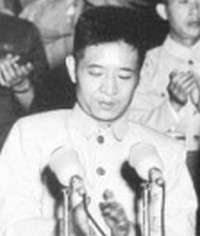Chairman of the Communist Party of China
| Chairman of the Communist Party of China | |
|---|---|
|
The emblem of the Communist Party of China | |
 | |
| Style | Zhǔxí(主席) |
| Residence | Zhongnanhai |
| Appointer | Central Committee |
| Precursor | General Secretary |
| Formation |
1922 20 March 1943 |
| First holder | Chen Duxiu |
| Final holder | Hu Yaobang |
| Abolished |
1925 1 September 1982 |
| Succession | General Secretary |
| Chairman of the Central Committee of the Communist Party of China | |||||||
| Simplified Chinese | 中国共产党中央委员会主席 | ||||||
|---|---|---|---|---|---|---|---|
| Traditional Chinese | 中國共產黨中央委員會主席 | ||||||
| |||||||
| Commonly abbreviated as | |||||||
| Simplified Chinese | 中共中央主席 | ||||||
| Traditional Chinese | 中共中央主席 | ||||||
| |||||||
The Chairman of the Central Committee of the Communist Party of China (simplified Chinese: 中国共产党中央委员会主席; traditional Chinese: 中國共產黨中央委員會主席; pinyin: Zhōngguó Gòngchǎndǎng Zhōngyāng Wěiyuánhuì Zhǔxí) was the head of the Communist Party of China (CPC). In 1982, it was succeeded by the General Secretary of the Central Committee.
History and functions
Between 1922 and 1925, Chen Duxiu (still Party Secretary) served as Chairman of the Central Executive Committee (simplified Chinese: 中央执行委员会委员长; traditional Chinese: 中央執行委員會委員長), but the name was changed in General Secretary of the Central Executive Committee in 1925. The post was first introduced in March 1943, when the Politburo decided to discharge Zhang Wentian as General Secretary. As his replacement, Mao Zedong, who had been the de facto leader of the party since the Long March, was named as Chairman of the Politburo of the CPC Central Committee (simplified Chinese: 中国共产党中央政治局主席; traditional Chinese: 中國共產黨中央政治局主席). The seventh CPC National Congress introduced the post of Chairman of the Central Committee into the party constitution, and in 1956 the General Secretary was given the day-to-day management of the Party Secretariat. The chairman was elected by the Central Committee in plenary session and had full powers over the CC, the Politburo and its Standing Committee.
The 1956 Party Constitution introduced the multiple Vice-Chairman post; since 1945, actual vice-chairmanship had been exercised by the Secretariat members. Liu Shaoqi was the highest-ranking vice-chairman from 1956 to 1966.
The 1969 Party Constitution (adopted by the 9th Congress) introduced the post of a single vice-chairman, in order to give more authority to Lin Biao as Mao's successor. The 1973 Constitution (adopted by the 10th Congress) re-introduced the collective vice-chairmanship. In 1976, Hua Guofeng was named First Vice-Chairman of the Central Committee, a post previously held unofficially by Liu Shaoqi from 1956 to 1966; Zhou Enlai from 1973 to 1975; and Deng Xiaoping in 1975 in the capacity of "Vice-Chairman in charge of the day-to-day work of the Central Committee".
The 1975 Chinese Constitution reinforced the influence of the party on the state. The Central Committee (and, by extension, its chairman) was placed before the National People's Congress. Article 15 said that "the Chairman of the Central Committee of the Communist Party of China leads all the armed forces of the country". These changes were reversed by the 1982 Constitution of the People's Republic of China which placed the Party below the State and created a state CMC in parallel to the Party CMC.
Although Hua Guofeng succeeded Mao as party chairman, by 1978 he had lost power to Vice-Chairman Deng Xiaoping, who was now acknowledged as the de facto leader of China.
The post of Chairman was abolished in 1982, and most of its functions were transferred to the revived post of General Secretary. The move was made as part of a larger effort to distance the country from Maoist politics. Specifically, Deng and the other members of the CPC leadership wanted to prevent another leader from rising above the party, as Mao had done.
List of the chairmen
| No. | Portrait | Name | Took office | Left office |
|---|---|---|---|---|
| 1 | Chairman of the Central Executive Committee (1922–1925) | |||
 |
Chen Duxiu (1879–1942) |
1922 | 1925 | |
| Abolished (1925–1943) | ||||
| 2 | Chairman of the Central Politburo (1943–1956) | |||
 |
Mao Zedong (1893–1976) |
20 March 1943 | 28 September 1958 | |
| Chairman of the Central Committee (1945–1982) | ||||
 |
Mao Zedong (1893–1976) |
19 June 1945 | 9 September 1976 | |
| 3 |  |
Hua Guofeng (1921–2008) |
7 October 1976 | 28 June 1981 |
| 4 |  |
Hu Yaobang (1915–1989) |
29 June 1981 | 11 September 1982 |
List of the Vice-chairmen
- 8th Central Committee (1956–1969)
- Liu Shaoqi (expelled in 1968), Zhou Enlai, Zhu De, Chen Yun, Lin Biao (from 1959).
- 9th Central Committee (1969–1973)
- Lin Biao (died in 1971).
- 10th Central Committee (1973–1977)
- Hua Guofeng (First Vice-Chairman from 6 April 1976, Chairman from 9 September), Zhou Enlai (died in 1976), Wang Hongwen (arrested in 1976), Kang Sheng (died in 1975), Li Desheng, Ye Jianying, Deng Xiaoping (from 1975 to 1976, and from 1977).
- 11th Central Committee (1977–1982)
- Ye Jianying, Deng Xiaoping, Chen Yun, Li Xiannian, Wang Dongxing, Hua Guofeng (from 1981), Zhao Ziyang (from 1981).
Gallery
Chairmen of the Party
-

陈独秀 Chen Duxiu
-

毛泽东 Mao Zedong
-

华国锋 Hua Guofeng
-

胡耀邦 Hu Yaobang

